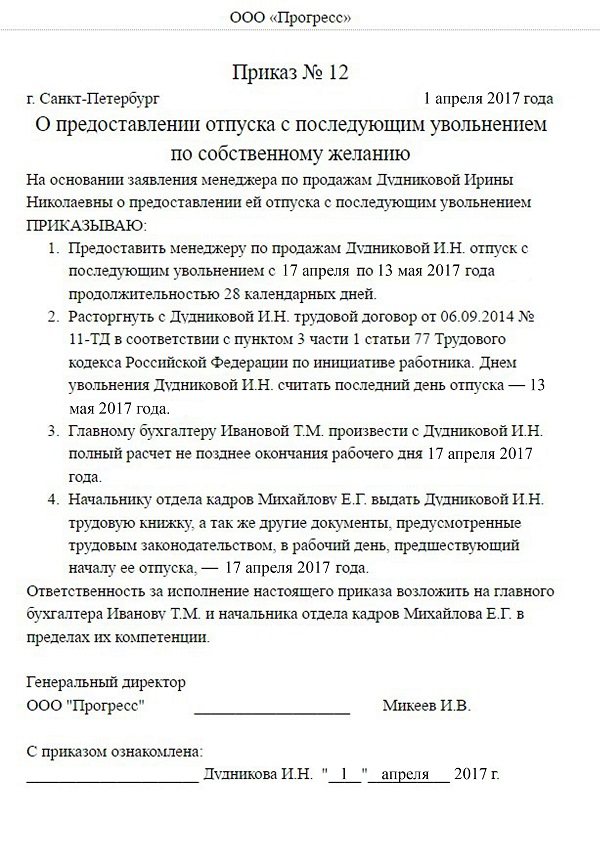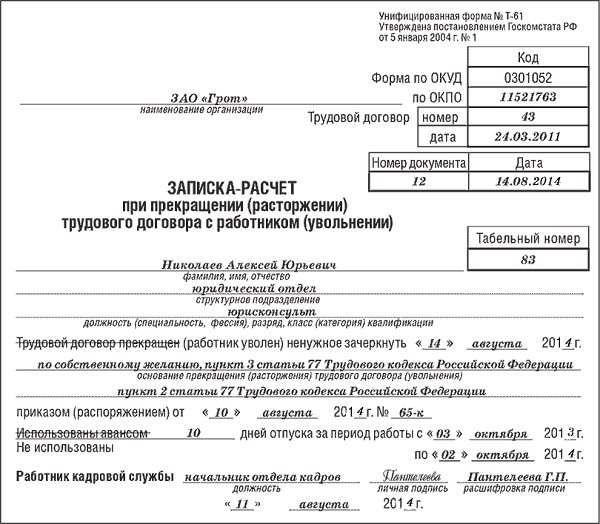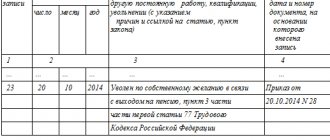Legislative regulation
The law states that it is permissible to terminate cooperation with a hired person while he is on legal vacation, but subject to a number of nuances inherent in this moment.
The issue of termination of employment relations during vacation is regulated by the Labor Code of the Russian Federation (Articles , , , 125, 137), as well as the norms of the Civil Code and decrees of the Government of the Russian Federation.
Termination of cooperation is possible on any vacation:
- planned;
- without maintaining salary;
- for child care.
You can resign if the employee himself wishes , the parties agreed on this in advance, about which there are relevant documents. At the request of the employer, such an action is prohibited. Exception - the company ceases to exist.
If the company is reorganized and not liquidated, then dismissal at the request of the director is unlawful. It is also illegal to terminate cooperation in the event of a violation of the procedure, for example, if the employee was not notified or was notified in a timely manner .
Watch a video about the features of dismissal from vacation:
When do you need to write an application?
If an employee decides to leave after a vacation, he acts according to the general rule - that is, he warns the manager in writing fourteen days before the intended termination of the contract . This rule applies in all cases, no matter what kind of leave we are talking about - planned, educational, for family reasons or child care.
If a subordinate cannot make a personal visit to the office, he sends the document by mail with notification and declared value . The director has no right to refuse to accept the document.
The deadline is counted from the day that follows after the application falls into the hands of the authorities. After two weeks, the employment contract is terminated. This way you can quit without working.
An exception to this rule is when a person needs to leave urgently on a specific day . This could be going to university or retirement. Then the boss is obliged to terminate the cooperation on the day indicated in the application (Part 3 of Article 80 of the Labor Code).
Dismissal of women caring for children, as well as expectant mothers, is also possible, but only at her personal request or if the company ceases to exist .
Read more about whether you can fire a woman while on vacation here.
In case of staff reduction or reorganization, dismissal is possible only if the woman was offered another position, but she refused. This is also possible if the woman got a job under a fixed-term contract during the absence of another employee (Article 77 of the Labor Code).
Is it possible not to allow an employee to go on vacation before dismissal?
First of all, let’s figure out whether the employer is obliged to let the employee go on vacation in such a situation. Let us say right away that in most cases such an obligation does not arise. There are only two circumstances when an employee must be given leave before dismissal:
- The company has approved a vacation schedule, and the vacation of the resigning employee falls exactly at the time before dismissal . That is, in fact, the employee decided to work until the vacation included in the schedule in advance, and after that not to go to work.
- The employee is a parent, guardian or trustee of a disabled child under the age of 18 or belongs to another category of persons entitled to leave at a time convenient for them .
If the situation is different, then the employer does not have an obligation to allow the employee to go on vacation before dismissal. The parties must come to an agreement.
If the resigning person goes AWOL, this will be considered absenteeism . As a result, an employee may be fired for absenteeism in accordance with paragraph 6 of part 1 of Article 81 of the Labor Code. The rightness of the employer who fired the absentee employee is confirmed by the letter of Rostrud dated December 24, 2007 No. 5277-6-1, as well as judicial practice, for example, the appeal ruling of the Supreme Court of the Sakha Republic dated June 3, 2015 No. 33–1849/15.
Next, we will consider the situation if the employer and employee managed to agree on the provision of leave before dismissal.
Decor
The procedure for terminating cooperation consists of the following stages:
- making a decision to leave;
- informing the employer, deciding whether he can first provide leave (this is not an obligation - Article 127 of the Labor Code);
- submission of two applications - for leave and dismissal and their endorsement by the director. It is allowed to submit one application for leave followed by dismissal;
- issuing a dismissal order;

- entry in the work book and personal card of the citizen;
- issuance of calculations and documents.
Important: during these two weeks, the employee has the right to change his mind and withdraw his resignation letter. He must do this before the end of fourteen days (even if the vacation has not yet ended on that day).
The only exception to this rule is if the employer has already selected another candidate for the vacant position , and he no longer has the right to cancel the decision to accept (for example, if a new applicant is hired as a transfer).
When refusing a vacationer who has changed his mind, the director is obliged to issue a written notice with a legal justification with reference to the current articles of legislation.
If the vacation is taken “at your own expense”
Leave without pay can be either annual, provided to beneficiaries (for example, pensioners), or extraordinary, at the request of the employee.
Citizens are entitled to five days of administrative unpaid leave in the event of a wedding, the birth of a child, or the death of close relatives. Such leave is entitled to any employee on each occasion, the total annual amount is not limited (for example, an employee can go on leave if he gets married, and then another five days upon the birth of a child). An employee cannot be dismissed during such leave, but he has the right to apply for dismissal on his own initiative.
When an employee goes on unpaid leave without permission and does not notify the manager about it (which is equivalent to absenteeism), he can be fired at the initiative of the employer. Or if a vacationer is delayed on vacation, the manager has every right to get rid of the “truant.” He is obliged to notify the dismissed person 14 days in advance. If the employee does not return to the workplace and does not sign the dismissal order, all documents are sent to him by mail. It is always better to send such documents with a return receipt, so that there is evidence not only of sending the letter, but also of its receipt.
Payments
A dismissed citizen is entitled to the following payments:
- wage;
- all previously unreceived compensation (including for unused vacation);
- severance pay (in case of layoffs during liquidation of the company).
Attention: if we are talking about voluntary departure (by agreement of the parties or on one’s own initiative), there can be no talk of any severance pay .
This should definitely be taken into account if serious problems have arisen in the employer’s business and he invites his subordinate to resign voluntarily in order to avoid unnecessary hassle. However, such an application should only be submitted if the boss’s wishes coincide with yours. Proving in court that you were forced to resign “on your own” is almost impossible.
Regular or advance leave
Labor legislation regarding dismissal applies to all categories of leave, including those given in advance. There are no differences in this regard here (Article 137, Article 77 of the Labor Code).
There are differences in the financial side of the problem, namely, deductions from wages . If someone, having barely gotten a job, received vacation in advance, and then decided to quit, then this is his right. The employer has the right to withhold unworked days in the calculation, but not more than twenty percent of official earnings.
A special decision of the manager on withholding is not necessary; a standard calculation note is drawn up , which shows the corresponding withholding (Determination of the Penza Regional Court No. 33-3297 of December 20, 2011).

Calculation and payments upon dismissal during vacation
An employee dismissed at his own request during vacation is entitled to the following payments:
- Wages for all days worked before vacation.
- If there are unused vacation days left, then compensation for them.
- Severance pay, which is paid in the case and in the amount as provided for in the employment contract.
If an employee quit during the vacation period, and as a result, vacation pay was recalculated, then according to Part 2 of Article 137 of the Labor Code of the Russian Federation, the employer can (at its own discretion) withhold from the employee vacation pay paid in excess of the new calculation. He has the right to withhold no more than 20% of the amount paid (including personal income tax deduction). In situations where all payments have already been made, there is nothing to withhold from, then it is permissible to sue the former employee to demand recovery. It is prohibited to make deductions if the employee was dismissed due to:
- the absence in the company of another vacancy required by the employee on a medical prescription, or the employee’s refusal of the proposed transfer;
- liquidation of the company;
- staff reductions;
- conscription for military and alternative civilian service;
- reinstatement of the previous employee to his position (for example, such reinstatement is possible by court decision);
- obstacles to labor relations in emergency situations (natural disasters, epidemics and others).
Possible reasons for refusal
If management refuses to dismiss you from vacation, you should look at the legality of the procedure. On the one hand, it is the boss’s right, and not an obligation , to provide leave before terminating cooperation (Article 127 of the Labor Code).
On the other hand, the refusal must have a justification . The worst thing that can be advised here is not to come to work without permission after your vacation. This will be quite rightly regarded as a violation of work regulations and absenteeism and will completely give the boss a free hand.
It’s another matter if there are violations in the procedure itself. For example, they refuse to issue a work book. If the boss delays issuing it, he is obliged to compensate for material damage to the ex-subordinate for all those days that he kept the document of experience in his possession (Article 234 of the Labor Code).
In this case, the day of termination of the contract is considered the day when the dismissed person finally received the book in his hands (Resolution of the Government of the Russian Federation No. 225).
You can also go to court. Don’t delay - you have a maximum of a month from the date of your official dismissal.
Is work required?

There is no such thing as working off.
There is a fact of warning of intentions expressed in the form of a statement. The next day the two week countdown begins.
On the 14th day comes the date of dismissal . This period is set so that the employer has time to replace the departing employee with a new one.
If the actual vacation is longer than the notice period, subject to mutual agreement, the date of dismissal can be postponed to the end of the vacation. But the start of “working off” is never postponed, which is very beneficial for the employee.
During the warning period, he takes vacations and does not sit at work. And even if he has outstanding obligations to the employer, the dismissal will still take place .









